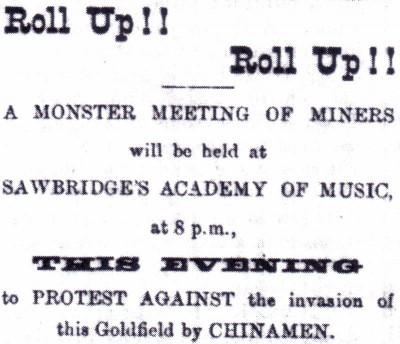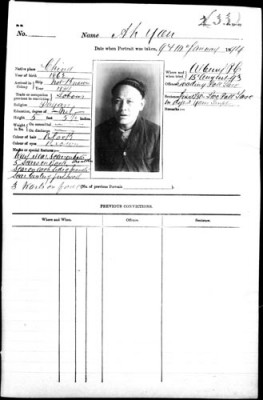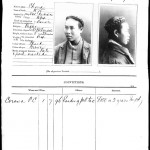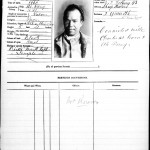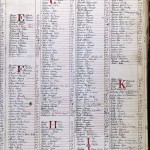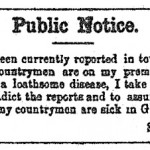The Chinese were not always welcome in Australia and were constantly reminded of their allegedly inferior status. The most commonly cited acts of discrimination and prejudice against the Chinese in Australia were the Lambing Flat riots of 1860 and 1861. The Chinese Immigration Regulation and Restriction Act, introduced after the riots, imposed a £10 poll tax, tonnage restrictions and prevented any Chinese person from becoming naturalised. It was repealed in 1867.
By the late 1870s anti-Chinese sentiments were escalating throughout the colony as a result of increased Chinese migration and a decision by the Australian Steam Navigation Company’s (ASN) to replace Australian crews by Chinese crews at less than half the standard wage. Migration restrictions were re-introduced in 1881, but before long anti-Chinese feelings arose again, fomented by some union leaders, politicians, newspapers and journals. The worst culprits were the Bulletin and the Premier of NSW Sir Henry Parkes, who harboured a deep-seated fear of a resurgent China.
Most Riverina newspapers were swept up in this general wave of hysteria and xenophobia, some using highly racist sentiments and language to convey their views. However, in general most local commentators were a little more ambivalent, sometimes expressing their disapproval of the Chinese as a race, but conceding their economic value and insisting on their rights to protection as residents of the colony. Many local white Australians knew or were acquaintances of Chinese people as gardeners, labourers or storekeepers, and were familiar with their various festivals and customs, which allowed for a more relaxed attitude, one not shared by many outside observers. Nevertheless, anti-Chinese protest meetings were held at Temora in 1883 and Tumut in 1887. The latter resulted in the formation of an anti-Chinese League, which subsequently floundered on the unpopular proposition that European landholders not renew leases to the Chinese or let fresh land to them.
Amidst much controversy these sentiments culminated in the passage of the Influx of Chinese Restriction Act 1888. The restrictions were harsh; the tonnage ratio being increased to 500 tons for each Chinese passenger and the poll tax increased to a prohibitive £100. A few exemptions aside, Chinese migration was all but prohibited, other than by people smuggling, and an increase in the Chinese gaol population all but assured. Wholesale evasion of the poll tax soon became commonplace, as did the large number of police and customs officers and informers needed to enforce it. Over time the restrictions drew scorn from the Riverina press, several police court reports from Moama, Deniliquin, Albury and Corowa indicating clear sympathy with long time Chinese residents, who were caught by an ‘uncaring bureaucracy’.
The evidence for prejudice and discrimination in the legal system is mixed. Chinese evidence was admissible in the courts and the use of interpreters was common; and the Chinese made full use of the courts to prosecute individuals, including their own countrymen. Despite the sudden increase in court cases involving the Chinese and the challenge for the judiciary, magistrates did their best to be even-handed.
By contrast, the police saw the Chinese as an easy target. They went to great lengths to prosecute the Chinese for gambling while ignoring the more frequent gambling in the towns’ clubs and hotels. Further much of the proceeds of the Chinese gambling went towards charities and contributed more money to local hospitals than any private house of club!
With sly grog selling, it is doubtful if the police would have had anywhere near as much success in making arrests and securing convictions without willing informants, both European and Chinese, who were rewarded for their ‘Judas’ acts with half the fine. The usual ploy was for the informant to proceed to the house in question with a marked coin and empty bottle provided by the police, then on purchasing the alcohol, departing and handing the evidence to the local constable, who had meanwhile observed the proceedings from some vantage point.
Two of the most common offences against the Chinese were fruit and vegetable stealing, and assault, the latter almost always unprovoked. At Gundagai in 1878 a correspondent bewailed the tricks played by the larrikin element on the Chinese and other vulnerable citizens, suggesting that the Chinese may be seen by the larrikins as ‘fair game for sport, on the principle “hit him again, he has no friends”’. Following an incident at Wagga in 1881 the correspondent commented that perhaps the fine would ‘teach other boys that Chinamen live under the same protection as other colonists and must not be ill treated’. At Adelong in 1881 a correspondent lamented that it was almost impossible for the Chinese ‘to move about without being assaulted.’
The Chinese were certainly not innocent in the area of crime, particularly on the goldfields, where the police were often absent and theft very prevalent. And some of their crimes were very Australian, such as sheep, horse and saddle stealing. But their punishments were in line with those meted out to Europeans for similar offences.
Although there were several incidents of mass assault or even murder, the level of physical provocation and abuse of the Chinese people in the Riverina, never rose to the heights seen occasionally on some Australian goldfields, these melees in turn paling into insignificance compared with the racial free for all with its associated murder and systemic violence characteristic of the USA.
This observation, however, needs to be tempered by the reality that many instances of physical and oral abuse never made it into the courts, especially when children were the targets. In one family the father countered such provocation by buying each of his sons a pair of boxing gloves and a punching bag. The next time they met their tormentors they were ready. Generally the boys could hold their own, with their fists if nothing else. Not so the girls, particularly if they had darker skin. They were teased and bullied, and called chinks and half-castes, a girl from one family committing suicide as result.

